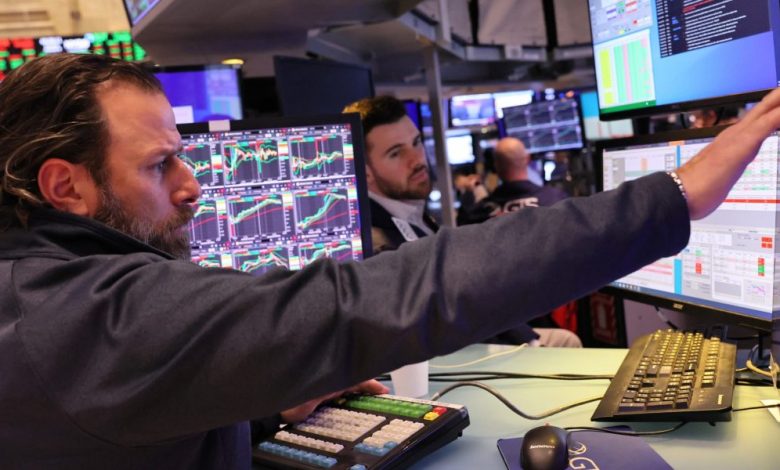Stock market investors expecting smoother sailing have history on their side

Stock market investors hoping for a breather after a brutally volatile 2022 have history — and options traders — on their side.
With inflation slowing, bolstering speculation that the Federal Reserve is nearing the end of its rate hikes, equity derivatives traders are anticipating a respite from the turmoil that ripped through markets last year. That has made the so-called volatility curve — a chart showing expectations for the severity of price fluctuations in the coming months — lower at every point than it was a year ago.
Other historical data points also suggest that the optimism of the past two weeks is not misplaced. Among others: Since the 1950s, during the recession of the early 1970s, and after the dot-com bubble burst earlier this century, which lasted three years, there have only been two consecutive annual stock market crashes. Nothing along these lines is expected for 2023, at least under the baseline scenarios of most Wall Street strategists.
“Given the bad last year, there is so much bad news that the markets are probably already pricing in,” said Ryan Detrick, chief market strategist at Carson Group. He believes the US can avoid a recession, which would be a “major positive catalyst” for stocks. “In terms of inflation, we see steps in the right direction. That is the key to the whole puzzle.”
Of course, investors shouldn’t expect a completely smooth process from here. In fact, January has been a tough month for the S&P 500 Index after a past double-digit annual decline.
Still, the S&P 500 is up 2.7% last week and is up more than 4% for the year. On Thursday, the Labor Department reported that the consumer price index fell in December from the previous month, posting the smallest annual increase since October 2021. The data was widely seen as giving scope for Fed officials to further slow the pace of rate hikes in February meetings.
These stock market gains are welcome news for stock bulls after the S&P 500 suffered a more than 19% loss in 2022, its worst hit since the 2008 financial crisis. The good news is that such declining years are usually followed by a rebound: The S&P 500 has recovered from them by an average of 15% over the next 12 months, according to data since 1950 compiled by the Carson Group.
“Markets may have good reason to see the glass half full on inflation and dismiss the central bank’s hawkish rhetoric,” said Emmanuel Cau, strategist at Barclays Plc.
Still, there are reasons for continued concern among equity investors, who have withdrawn $2.6 billion from US equity funds in the week ended Jan. 11, according to a statement from Citigroup Inc., which included data from EPFR be quoted globally.
It is possible that the Fed could eventually defy market expectations. Officials point out, for example, that traders are wrong in expecting interest rate cuts later this year. And the latest corporate earnings reports are just coming out and carry their own risks.
Those skeptical that January’s gains will be sustainable can also point to their own precedent. In the four instances where markets have posted double-digit declines in one year since the turn of the century, stocks have fallen three times in the first month of the following year.
But for now, at least, traders aren’t expecting any major shocks. The two main economic reports of the month – the jobs numbers and the consumer price index – have already been released and showed that growth is continuing and inflation is decelerating.
The Cboe VIX index — a measure of forecast price fluctuations in the S&P 500 that usually moves in the opposite direction of the index — closed last week at about 18, its lowest level since last January.
Institutional investors have been covering their short bets on stocks for the past few weeks, increasing their net long position to the highest level since May 2022 earlier this month, Ned Davis Research’s analysis of CFTC data shows.
“If there’s a recession that lasts about two quarters, markets should be pricing in a rebound in the second half of the year,” said Ed Clissold, chief US strategist at Ned Davis Research. “If the inflation data continues to be favorable and earnings are pretty solid, you could argue that hedge funds will continue to cover their short positions, which would be pretty good fuel for the rally to continue.”
Learn how to navigate and build trust in your organization with The Trust Factor, a weekly newsletter exploring what leaders need to succeed. Sign up here.



